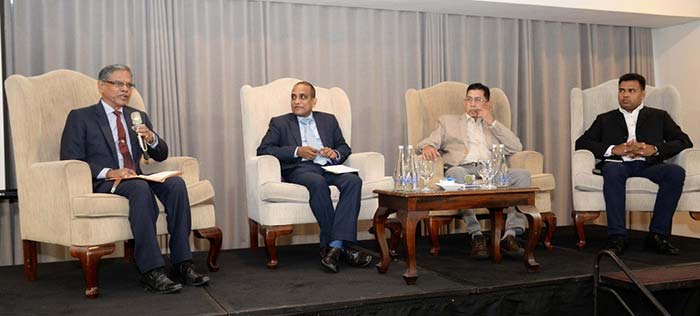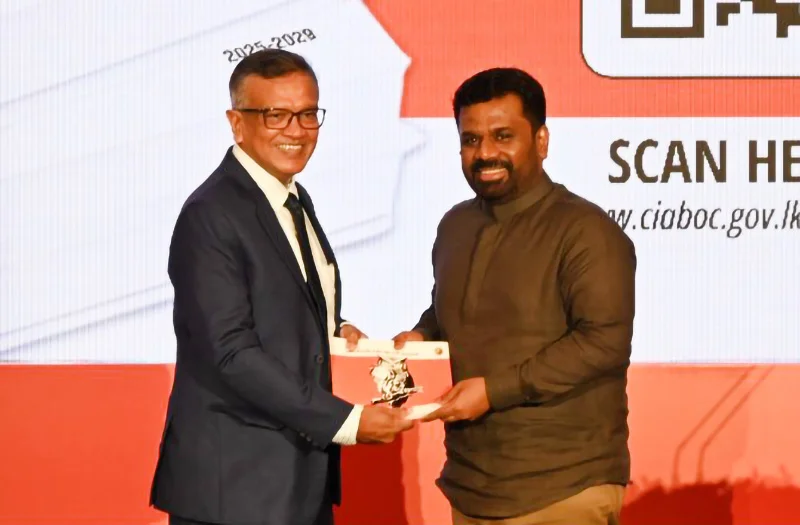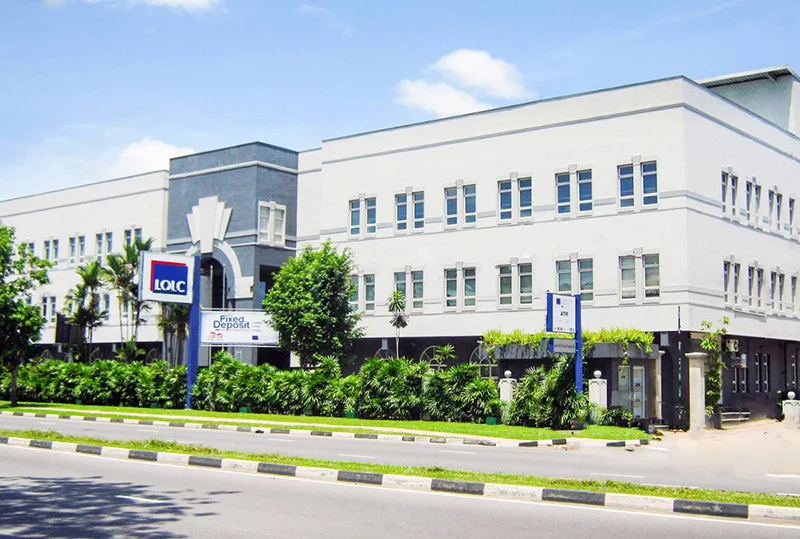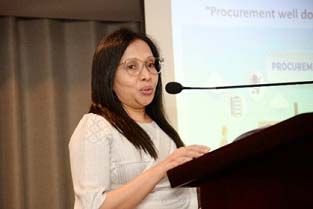Business
Workshop on Procurement Planning by Open University’s Faculty of Management Studies

Prof. Nalin Abeysekara
Dean Faculty of Management Studies
R.H. Asari Tharuka Perera
Programme Coordinator
M.Sc. in Public Procurement and Supply Chain Management
The Open University of Sri Lanka (OUSL) is a pioneering national university in Sri Lanka designed to provide education through open and distance learning methods. The Faculty of Management Studies of the Open University Sri Lanka has over 40 years of experience in offering a variety of programs including master’s programs, degree programs, certificate courses, diplomas and postgraduate degree programs.
Recently, it launched a new postgraduate degree program, MSc in Public Procurement and Supply Chain Management. This program is for individuals seeking a postgraduate qualification in public procurement and supply chain management. A distinctive feature of this program is its status as the first postgraduate qualification offered in public procurement in Sri Lanka.
Beyond its typical academic role, this program contributes to creating a platform for discussing the importance of public procurement and supply chain management in both the public and private sectors in Sri Lanka. Efficient and transparent public procurement is crucial for the effective functioning of governments. It ensures that public funds are used responsibly, promotes fair competition among suppliers, and contributes to economic development. The unique selling proposition (USP) of this program is the combination of public procurement and supply chain management with practical discussions with industry experts.
More importantly in Sri Lanka at the moment there is a debate within society on public procurement aligned with, corruption, lack of competition, and complex regulations. In the context of public procurement, ensuring good governance is crucial to prevent corruption, promote fairness, and achieve value for money. Implementing transparent and accountable procurement practices contributes to overall good governance within a country or organization.
All stakeholders in the country must address these challenges to ensure the effectiveness of public procurement processes. To address this problem the Faculty of Management Studies plans to organize a series of workshops with procurement specialists in Sri Lanka. The first workshop was conducted with industry experts, professionals, and academics in procurement and supply chain under the theme of ‘Procurement Planning’ was held on January 25, 2024, at the Water’s Edge Battaramulla. The learning partners for the MSc in Public Procurement and Supply Chain Management also actively participated in the event.
Mrs. P. Sujeewani Muthunayaka, Assistant General Manager (Procurement Planning and Monitoring) at the National Water Supply and Drainage Board, was invited as the chief guest for this event. During her speech, she discussed the simplification of procurement and supply chain processes, sharing her valuable experiences with the audience. She explained the procurement planning process of the Water Board and emphasized the importance of research and development, as well as effective collaboration between local and foreign contractors for the success of projects.
Mrs. Muthunayaka brought numerous examples to the table while illustrating the role of technology in the simplification process of procurement planning. Significantly, she shared the success story of the NRW (Non-Revenue Water) project, highlighting the reduction of unauthorized water connections and administrative losses. Furthermore, she elaborated on the adaptation of E-procurement and the simplification of the procurement planning process at the National Water Supply and Drainage Board in Sri Lanka.
During this event, OUSL, positioning itself as a responsible academic institution committed to societal improvement, proudly announced the initiation of the Procurement and Supply Chain Consultative Committee. This marks a crucial step in fostering collaboration between academia and industry to shape the future of learning partnerships and make a meaningful impact on the industry landscape.
Professor Nalin Abeysekera, Dean of the Faculty of Management at OUSL, declared that Mr. Ivan Tissera, a member of the National Procurement Commission, and Mr. I.G. Perera, a Supply Chain and Lean Management Specialist, would serve as co-chairs of The Procurement and Supply Chain Consultative Committee.
The “Procurement Planning” discussion forum was conducted with the participation of specialist panel members: Mr. Christy Perera, Advisor for National and International Procurement; Mr. Emmanuel Susitha, General Manager of Support Services at Star Garments Group; and Mr. Sameera Landekumbura, Senior Manager of Procurement at Siam City Cement Lanka Ltd. The forum was moderated by Mr. I.G. Perera, a Supply Chain and Lean Management Specialist.
In the discussion forum, participants primarily engaged in discussing timely topics related to procurement planning. The panel discussion provided insightful ideas into the procurement planning processes across various business activities. They emphasized the significance of market research in the procurement planning process and delved into the risks associated with the process, along with strategies for risk mitigation.
The conversation then shifted to current issues in the apparel industry, exploring procurement and supply chain strategies to address the challenges faced. Additionally, the panel paid particular attention to a crucial topic E-Procurement and highlighted the need for Sri Lanka to transition towards e-procurement in the future. The discussion forum subsequently focused on the sustainability of procurement planning. This discourse was enriched with expert insights, shedding light on how Sri Lanka, as a country, can develop a robust procurement system for good governance.
Furthermore, Dr. S. Sridharan, the Deputy Director General of Health Services Planning at the Ministry of Health, shared valuable practical experience in public procurement and planning. His insights not only clarified the complexities of the field but also provided a unique healthcare-oriented perspective. The exchange of ideas during the session undoubtedly broadened the audience’s knowledge, fostering a more comprehensive appreciation for effective procurement strategies in the public sector.
The workshop was honored by the presence of distinguished guests with the blessings of senior Professor P.M.C Thilakarathne, Vice Chancellor of The Open University of Sri Lanka., Professor Nalin Abeysekara, the Dean of the Faculty of Management Studies and Dr. S. Sapukotanage, Head of the Department of Marketing Management. More importantly, the entire M.Sc. program in Public Procurement and Supply Chain Management is conducted by specialists in procurement and supply chain management with international experience.
Business
National Anti-Corruption Action Plan launched with focus on economic recovery

In a decisive move to stabilize Sri Lanka’s economy and rebuild investor confidence, the Commission to Investigate Allegations of Bribery and Corruption (CIABOC) yesterday launched the National Anti-Corruption Action Plan (NACAP) 2025–2029, with a clear focus on promoting transparency, accountability and economic governance.
Developed with the support of the United Nations Development Programme (UNDP) and funded by the government of Japan—contributing nearly USD 900,000—the initiative aims to address corruption as a critical economic barrier.
The launch, attended by President Anura Kumara Dissanayake, Chief Justice Murudu Fernando PC, and high-level diplomatic and institutional representatives, signals a shift in Sri Lanka’s economic reform narrative. The NACAP is seen not just as a governance tool but as an economic recovery strategy designed to attract foreign investment, improve public finance management and rebuild public trust.
R.S.A. Dissanayake, Director General of CIABOC, noted that corruption, “is more than a legal issue—it is an economic cancer that stifles innovation, distorts markets and deters foreign direct investment.” The establishment of Internal Affairs Units (IAUs) within government institutions is expected to bring internal oversight to public spending and performance, improving the efficiency of state services.
Japanese ambassador Akio Isomata stressed that eliminating corruption is essential for Sri Lanka to regain global investor confidence. “Transparency and good governance are fundamental pillars for sustainable economic development, he said. “For Sri Lanka to attract foreign investment and achieve long-term growth, the effective implementation of this Action Plan is crucial.”
Echoing this, UNDP Resident Representative Azusa Kubota highlighted the importance of aligning governance with economic goals. “The NACAP is a roadmap for transforming Sri Lanka’s economic governance, she said. “It will make corruption visible, measurable, and actionable.”
The NACAP is built on four strategic pillars—Preventive Measures, Institutional Strengthening & Enforcement, Education, and Law & Policy Reform—targeting nine priority areas. These include streamlining state enterprise management, modernizing financial crimes investigation and integrating anti-corruption education into economic policymaking.
The implementation timeline is designed with a phased approach: short-term stabilization, medium-term reform and long-term transformation—ensuring consistent progress toward a more accountable and economically resilient state.
“Corruption ends here. The responsibility of eradicating bribery and corruption will not be passed on to the next generation — it will be resolved by our government today, President Anura Kumara Dissanayake said.
The President stressed it marks a turning point in Sri Lanka’s history. “With the launch of the National Anti-Corruption Action Plan 2025–2029, we are drawing a bold line in the sand. No longer will the fight against corruption be tangled in politics or postponed for the future. Public officials now have six months to bring transparency and integrity to their institutions. After May, the law will act decisively and without exception. This is not just policy — it’s a promise. A new era of accountability has begun and it begins with us.”
By Ifham Nizam
Business
Verdant Capital doubles down: $13.5m now powering LOLC Africa’s MSME expansion

Verdant Capital invests $4.5M more in LOLC Africa, expanding MSME lending across 10 countries and deepening financial inclusion efforts continent-wide.
Verdant Capital has announced that its Verdant Capital Hybrid Fund (the “Fund”) has completed an additional investment of USD 4.5 million in LOLC Africa Singapore Limited (“LOLC Africa”). This investment brings the total investment in LOLC Africa to USD 13.5 million. This follows the initial investment of USD 9 million in LOLC Africa, completed in June 2023. Both investments are structured as holding company loans, and they are being directed towards LOLC Africa’s operating lending subsidiaries in Zambia, Rwanda, Egypt, Kenya, Tanzania, Nigeria, Malawi, Zimbabwe, Ghana, and the Democratic Republic of Congo.
Founded in 1980 in Sri Lanka, LOLC entered the African continent in 2018. Verdant Capital Hybrid Fund is the first external investor in LOLC Africa’s operations, reflecting the Fund’s catalytic investment approach. These investments are driving the expansion of LOLC Africa’s micro, small and medium enterprises (MSMEs) financing footprint across the continent. Additionally, the Fund’s Technical Assistance Facility (TAF), has offered financial support for LOLC Africa’s Social Ratings and Client Protection Pre-Certifications for its subsidiaries in Zambia and Egypt, with further Technical Assistance initiatives in the pipeline.
Business
HNBA’s advisor & partnership channels drive 26% growth

HNB Assurance PLC (HNBA) delivered another year of outstanding financial performance, securing a 7.5% market share and moving a step closer to achieving its ambitious target of 10% market share by 2026. This success was a result of the company’s well-structured strategies, focused on sustainable growth in an increasingly competitive landscape, which yielded impressive results, with its Gross Written Premium (GWP) growing by 26% compared to the previous year.
Over the past four years, HNBA has maintained an average growth rate of 26%, consistently outperforming the industry. A key element of HNBA’s approach has been prioritizing distinctive, value-driven products over high-volume, lower-margin offerings. This strategy has allowed the company to cater to a broader customer base, ensuring inclusivity while maintaining the competitiveness and relevance of its product portfolio
In terms of growth, HNBA’s proactive investment strategy resulted in an 8% growth in investment income, reaching Rs. 6.9 Bn, while Funds Under Management saw a 26% increase. HNBA paid net benefits and claims totaling Rs. 2.9 Bn. The total assets of the company expanded by 24% to Rs. 53.4 Bn, primarily driven by increased financial investments. Additionally, total Life Insurance contract liabilities grew by 25% to Rs. 38.6 Bn, following a surplus transfer of Rs. 1.3 Bn to shareholders.
-

 Business4 days ago
Business4 days agoColombo Coffee wins coveted management awards
-

 Business6 days ago
Business6 days agoDaraz Sri Lanka ushers in the New Year with 4.4 Avurudu Wasi Pro Max – Sri Lanka’s biggest online Avurudu sale
-

 Features5 days ago
Features5 days agoStarlink in the Global South
-

 Business7 days ago
Business7 days agoStrengthening SDG integration into provincial planning and development process
-

 Business6 days ago
Business6 days agoNew SL Sovereign Bonds win foreign investor confidence
-

 Features2 days ago
Features2 days agoSri Lanka’s Foreign Policy amid Geopolitical Transformations: 1990-2024 – Part III
-

 Features5 days ago
Features5 days agoModi’s Sri Lanka Sojourn
-

 Midweek Review2 days ago
Midweek Review2 days agoInequality is killing the Middle Class












